Ukraine, Russia, and the Long Shadow of Nuclear Proliferation
A Cold War History and a Too-Hot Future
It is hard to overstate the significance of the square at the heart of Kyiv, Ukraine, now called the Maidan Nezalezhnosti. The stones of the Maidan have silently endured generations of trouble and fights over what Ukraine should be. Every few decades, starting with the collapse of the Soviet Union, students and activists have felt the need to cover it in tents and banners and protest signs, and then their own blood, resisting government oppression and rampant corruption.
This is not primarily because of their own political class, or their own societal strife. It is because of their terrible next door neighbor, Russia.
The Past As Prologue
In 1990, right before the world’s sociopolitical system came apart, Ukrainians were one of many peoples protesting, rejecting the interference they’d faced from the Soviet Union all their lives. Along with their Baltic Neighbors (Estonia, Latvia, and Lithuania) They created a human chain of millions of people across these countries in a line. In Ukraine, it stretched from Kyiv to Lviv, over 300 miles of bodies held together, hand to hand. It was as if everyone was waiting for their bread, but the bread was their goddamn political freedom. It was a unique and striking political protest, but it was also dangerous.
The Russian empire, in the form of the Soviet Union at that moment, had made it clear over generations that they’d kill these people without a thought, but these people were willing to risk it. At the end of the protest, they won, and the Soviet Union fell. From Tallinn to Kyiv, and beyond into the wider Soviet world, so many people protested in so many ways, that the Soviet Union came apart. Moscow lost control, just as the Russian empire had as well, nearly a century earlier. In Ukraine Prime Minister Vitaliy Masol resigned, and shortly thereafter, Ukraine became a true independent nation. In 1990, the Maidan was called October Revolution Square, but after these events it would become Maidan Nezalezhnosti: Independence Square. Ukraine was born a free country, ostensibly to chart its own course into the 21st century.
But the Russian attention persisted, ebbing and flowing with administrations and corruption scandals. Years later the square would again fill, first becoming the home of the 2004 Orange Revolution, and then, at the tail end of the Arab Spring revolutions in 2013, the square became the home of the Euromaidan Protest. The Ukrainians looked westward to escape the stifling influence of their corrupt and overbearing neighbor.
By 2014 the Ukrainian people, especially the young people, were again having to tell the world they were done with the Russians. They wanted to be free. They chanted and carried banners by day, and slept in the square at night under the Ukrainian sky.
They built a tent city. It was terrifying and jubilant. I visited their city within a city on the Maidan, shortly after their Russian puppet president had been forced to flee. I saw the kitchens and sleeping places, the weaponry they’d captured from their government and turned back on the troops attacking them. There were memorials they built to their dead, and flowers, flowers absolutely everywhere. It was spring in Ukraine. But despite the spring, Christmas decorations still hung on the street furniture, left over from the beginning of this tiny war of great consequence.
The young people even took over the ersatz king Yanucovych’s palace, Mezhyhirya, complete with a room full of sets of medieval knight’s armor, a bowling alley, boxing ring, a fake galleon for parties, and a zoo full of too many poorly-kept animals. The zoo included many large animals and rare birds kept in inhumane conditions, pushing Yanukovych at least one more circle down in Hell when he gets there.
It is to this day the weirdest place I’ve ever been, and I’m from Los Angeles.
Ukraine turned west after the Euromaidan protest, and Putin couldn’t have that. Within months he invaded and took Crimea. He moved like a gangster with no mandate beyond pointing a gun at his neighbor’s head. The world let him do it. The objections would a few editorials, some weak sanctions, and not much more. But it should have been much more, because promises are the power of international relations, and promises, old promises, were being broken.
That’s a Lot of Nukes
When the kids packed up the tents from the Maidan back in the 1990s, Ukraine was, by the happenstance of the Cold War, gaining independence as the third largest nuclear power in the world. It went Russia, USA, then Ukraine. There were housing thousands of the former Soviet Union’s nuclear warheads. This was a problem for everyone, including Ukraine. The next several years were the unwinding of the Cold War, and it was dirty and corrupt and strange, for everyone, not just Ukraine. But also one of the most hopeful moments in modern history. Maybe we weren’t all going to die in nuclear fire after all. Young people all over the world had to plan for… a future? That was one of many new and uncomfortable feelings of the early 90s.
The Ukrainian experience exemplified all of the contradictions of the end of the Cold War, struggling to find itself amid corruption and power plays, both internal and international. It was the chance to emerge from Soviet oppression, to be its own nation, to find itself within the community of nations. But the process was delicate, and never simple, given the nuclear weaponry and the century or more of looting and oppression the Ukrainians had faced.
It is not a good thing for a country to have terrible financial problems, a broken society, and enough nuclear weapons to end civilization several times over.
The Ukrainians knew this as much as anyone did, but some of the leaders and the people wanted to keep at least a few of those weapons to make sure the Russians didn’t ever come back. They were not afraid of the Americans, or the Europeans, they were afraid of Russia — of the Russians coming back. That was always clear, and always rational.
Much of the world, but most importantly the United States, didn’t want unstable countries to have nukes. Several other former Soviet states also had nukes, but they gave them back to Russia without as much fuss. It took several years to resolve the issue in Ukraine, because Ukrainians spent some time not so sure about giving up their radioactive security blanket.
So four years into this potential crisis, the Americans just paid Ukraine to give all their nuclear bombs to Russia. All three countries, plus the UK, sat down and hashed out a deal. It’s called the Budapest Memorandum, and it said if Ukraine gave up all of the bombs, these three other nations would see to Ukraine’s security. If anyone came to threaten Ukraine, the US, Russia, and the UK were obligated to defend Ukraine in war, equipment, actual boots on the ground — whatever it took. Ukraine did not hold out for the word “guarantee” in the security agreement they got for handing back the nukes to Russia. Maybe they should have, but in the end, it’s just words, isn’t it?
With this done, the former Soviet republics, including Ukraine, also signed the Nuclear Non-Proliferation treaty, saying they would never seek to have nuclear weapons. The Budapest Memorandum probably made the world a better and safer place at a precarious time. It was one of the highlight moments in the history of keeping humanity from setting ourselves on fire like idiots.
But Russia never stopped meddling in Ukrainian politics, and the Ukrainians never stopped hating it.
Broken Promises
Because of this history, what’s at stake in Ukraine right now is different from every other conflict, however tragic and awful they may be. It’s not just the lives of innocent Ukrainians, or the geopolitics of Eurasia, but the course of humanity’s nuclear future. Because promises made have become promises broken, and broken nuclear promises concern us all.
The h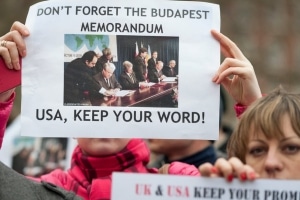 ope that filled Maidan Nezalezhnosti in 2014, just like 1990 and 2004, was that what people wanted for themselves could matter. That they could have a fate that wasn’t just determined by what distant rich old men in charge of so-called great powers thought they should have. Later that year, Putin answered their hopes by breaking Russia’s promises and invading and annexing Crimea. He threw away the commitments made in Budapest in exchange for all those nukes, right there on the world stage.
ope that filled Maidan Nezalezhnosti in 2014, just like 1990 and 2004, was that what people wanted for themselves could matter. That they could have a fate that wasn’t just determined by what distant rich old men in charge of so-called great powers thought they should have. Later that year, Putin answered their hopes by breaking Russia’s promises and invading and annexing Crimea. He threw away the commitments made in Budapest in exchange for all those nukes, right there on the world stage.
The other signatories of the Budapest Memorandum, including the US, just let him do it. This is what a nuclear agreement was worth: some hand-wringing, some sanctions, a news cycle, a funny segment on Last Week Tonight. It got a few think pieces about the history of Crimea and Where It Really Belongs.
But the spirit of the Maidan has never left the Ukrainians. They fought the Russians on the peninsula, and kept fighting right up to the full scale invasion in 2022. “I need ammunition, not a ride,” Zelensky famously told the world that February, or really, he told the Americans (and maybe the UK?), the people who had signed the Budapest Memorandum, the people who had promised to protect them in exchange for giving up their power to end our world.
And with all this, we are back in the hot end of the Cold War, being fought by people who weren’t even alive when the Cold War supposedly ended. But wars like this, wars of identity and autonomy, have an annoying tendency to never really end. Perhaps this one won’t until the last nuke is torn apart and thrown into the last pit to decay for the rest of the life of the solar system.
Those old nukes make this war a different from all the other wars, genocides, and atrocities crowding in on our attention these days. Despite the gallons of ink spilled on it, it isn’t ultimately about Zelensky being a good guy, or European fear of invasion, or even Good against some narratively archetypal Russia Being Evil. All of that is window dressing, like the Ukrainian flags hanging outside all the civic buildings around Europe. In the long run, it isn’t even about a moral stand, even if that is the politically convenient way to talk about it. It’s a terrible time on Earth in terms of wars and genocides right now, but the conflict in Ukraine is different. Not worse; it’s all too bad to be ranked. But the consequences of our failure to honor the Budapest Memorandum could be more terrible than we have imagined. They could be the end of our era on our little blue planet.
Ukraine gave their nukes back to Russia, and were betrayed. For everything we’ve said about standing with Ukraine, and their right to exist, or their crops feeding the world, or their millennia-old story as a nation, none of that is what history will remember. What happens to Ukraine will determine the state of the international order, and possibly whether everything that calls itself a nation is going to be clamoring to get their very own fleet of radioactive world-enders.
Because if Ukraine goes down, there’s one message: if you don’t want to be completely dominated or destroyed by any country larger and more powerful than you, you have to have nuclear weapons. Does anyone imagine Ukraine would be having any trouble with Russia at all if they could be putting radioactive air bursts over St Petersburg and Moscow?
They would not.
Ukraine isn’t about Ukraine at the scale of human history. It’s about whether we want to continue having lots of people on Earth, or just spend the next thousand years LARPing the Fallout games.
Thusly the first lesson of the 2014 invasion of Crimea was don’t trust the Russians. Maybe also don’t trust the Americans and the UK, to always and immediately have your back. But as that conflict has progressed to now, another lesson has emerged: if you don’t want to be crushed by your powerful neighbors you better be willing and able to reduce their cities to radioactive glass.
When Everyone Needs Their Own Nuke
 Right now, there’s little public appetite for smaller powers to get nukes. The assumption, grown out of the great power politics of 19th and 20th century Europe, was that great powers having them meant no one would need them, because the great powers would shield smaller nations from violence. But that assumption is failing catastrophically. Smaller powers have started to realize they need their own nuclear deterrent.
Right now, there’s little public appetite for smaller powers to get nukes. The assumption, grown out of the great power politics of 19th and 20th century Europe, was that great powers having them meant no one would need them, because the great powers would shield smaller nations from violence. But that assumption is failing catastrophically. Smaller powers have started to realize they need their own nuclear deterrent.
This emerging calculus applies to thousands of “little” conflicts around the world. But no conflict is little when it’s your conflict. North Korea is the obvious example of the future we’re flirting with. They’re a poor hell country in an absolutely terrifying neighborhood that realized they literally needed nukes more than food. But they have their bombs. Their continued existence can only be threatened by their own incompetence, no one else can touch them.
These cases, where a state’s sovereignty is in question, are everywhere. As a random example, (and deliberately not one I think is currently likely) take Ethiopia. Prime Minister Abiy Ahmed has a couple of priorities: getting a trading port on the Red Sea, (Ethiopia is the largest landlocked country in the world by population), and basic electrification. They’ve recently destabilized the region by recognizing the break-away state of Somaliland in exchange for a trading port, pissing off Somalia something fierce.
Equally contentious, the administration is working on a massive hydroelectric project with the potential to electrify a lot of Ethiopia, and maybe export power to some neighbors. But Egypt, the military powerhouse in the neighborhood, doesn’t want to deal with the reduced flow on the Nile for a some years as the dam is filled. They have threatened to bomb the project out of existence, if they don’t get their way on the Nile — lights that might never come on. All while Somalia tries to box in Ethiopia’s trade hopes in order to hold itself together.
Would it be irrational for Prime Minister Ahmed to want a nuke or two to hold the neighbors at bay? It’s expensive and impractical, so yes, …but also no. The nuclear club gets yelled at plenty, but as the DRPK has shown, it also gets respect, and ultimately, nuclear nations get left alone, something Ethiopia might appreciate.
There’s many others who currently might want to go nuclear; that’s how proliferation works. Iran has been vaguely trying for ages, which means their frenemy Saudi Arabia would not want to be left behind. Syria has tried because Syria is insane. And Turkey? They don’t like being left out of things.
If ever the US waivers in its international support, South Korea would be existentially foolish to pass up joining the nuclear club. If the Korean peninsula is fully nuclear, Japan might feel compelled to follow, even with its history.
The world quietly becomes more dangerous as the post Cold War great power promises fail, and it’s not getting harder to build a nuke.
A post-Budapest proliferation world could be terrifying, especially as it is pushed into political chaos by Russia, the Middle East, and most of all, Climate Change. It is exactly the world everyone has wanted to prevent since the Trinity test. The old cold warriors aren’t supplying Ukraine out of the kindness of their hearts, but out of the cold calculus of the deal with the Devil we all made in New Mexico.
The Boomers of international relations know what’s at stake here is non-proliferation, which they’re already watching fail in Asia. This is a dark future we’re toying with, where small states play nuclear brinkmanship over resources made unreliable by climate change. And they have to, because the modern great powers, pulling back from their allies, haven’t given them any choice. As increasingly insecure and isolated western countries hoard resources, close borders, and most importantly, abandon agreements to protect the integrity and dignity of smaller allies, nuclear armament just makes more sense.
The NPT (Nuclear non-Proliferation Treaty) is still a going concern, if no longer a famous or fashionable one. We don’t dream in mushroom clouds anymore, like the kids did in the 1970s and 1980s. The treaty has been medium successful; the number of nuclear weapons has gone down by a lot, and the number of nuclear armed states hasn’t gone up by as much as was expected back in the 1970s. But should Ukraine fall, the NPT could simply become a dead letter. Why should anyone trust their existence to an international norm the internationals don’t care about? The world is watching Ukraine; the question is what historical lesson it will take away from this war.
Ten years after the Revolution of Dignity
Despite the bombing and the strain of this war on the city, Maidan Nezalezhnosti is not empty these days. It is still the heart of Kyiv, and a moral center of the country itself. It is decorated with pictures of the lost places and people of Ukraine, and sometimes filled with families and protestors, demanding into the wind the return of their family members, and their homes. It is still a place of hot and angry hope. Kyiv, like the rest of the world, is uncomfortably warm right now in record-breaking August heat. It will be surpassed soon by the next record breaking month on our little blue dot, as the heat the destabilizes our physical systems along with our political and social systems.
Right now, Maidan’s sound track is too often the air raid siren, signalling people to head into the subway system because of incoming missiles they hope to, and usually do, shoot out of the sky. It is a terrifying testament to an unanswered question: What kind of a world order do we want?
With thanks to ducurodionoff, CC Attribution-NoDerivs 2.0, neiljs CC BY 2.0


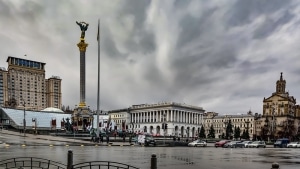
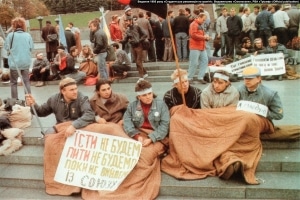
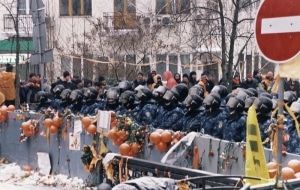
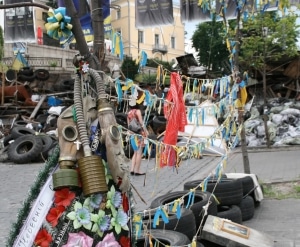
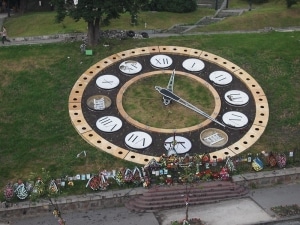
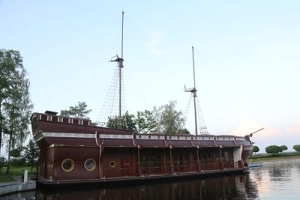
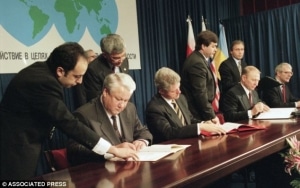
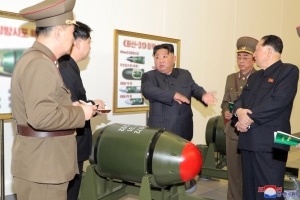
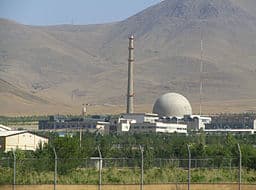




You left out on important issue. If the US cannot keep its promises to Ukraine, Israel will be forced to develop a nuclear arsenal.
It is very, very widely believed that Israel already has a nuclear arsenal and the means to deliver.
https://en.m.wikipedia.org/wiki/Nuclear_weapons_and_Israel
beat me to it, but yeah. This is one of the main reasons why Iran keeps wanting to go for it, and why there’s a lot of negotiation around it. It’s hard for the US to have the high moral ground telling them not to when everyone knows Israel is nuclear.
Thanks. After I commented I thought that was probably the case.
Wouldn’t an Iranian bomb be both a counter to the Israeli bomb as well as a Shi’a counter to the Sunni bomb in Pakistan? (Which would fuel the desire for a Wahhabi/Salafist bomb for Saudi Arabia…)
Thirty years too late on that score. Israel has been a nuclear armed menace ever since the seventies at least. No wonder Iran wants a nuke of its own…
Is there’s some place in L.A. that exemplifies anything close to the weirdness of Yanukovych’s palace??
This is a bit outside of LA (past Santa Barbara even), but it does have a lot in common with Hearst Castle.
https://en.wikipedia.org/wiki/Hearst_Castle
Main difference being is they take very good care of the animals there…
The description of Yanukovych’s compound reminds me more of Pablo Escobar and his hippos in Colombia. The hippos survived him! Hearst Castle is certainly opulent when viewed as a tourist destination, but not necessarily “weird”…unless you consider the lifestyle that William Randolph Hearst was living at the time.
There’s a lot of wholesome weirdness in LA. If you’re ever in town, I’d strongly recommend a trip to the Museum of Jurassic Technology. as for the north of LA options, The Madonna has many points of charm that …exceed even Hearst, in its own way.
I’ve heard of the MJT for years but have never been there. Perhaps I owe them a visit soon. Looked at their website and the Floral radiographs look particularly intriguing. As well as the exhibit on Dogs of the Soviet space program…
Do go, but be prepared that it’s not a museum of odd things, it’s an odd museum of things, or possibly a museum of a museum of odd things. And stop by India Sweets and Spices next door for lunch, too.
It’s not as if I disagree with the thesis, but it needs some refinement, perhaps. I note this because Ukraine forces have been operating inside Russia’s borders for three weeks now, with no nuclear repercussions. The forces in question do not represent an existential threat to Russia, but it is a bit of a surprise to me that a tactical nuke has not squashed this operation.
Maybe we’ve overestimated the value of nuclear deterrence?
For Putin, deploying a tactical nuke on Russian territory would be a hugely embarrassing admission of weakness.
That certainly seems plausible. I think there are maybe other factors, such as how India might react. (By the way India and Pakistan, both nuclear powers, have gotten into it without nuking each other.) Of course, he could also play it as a demonstration of his iron resolve to protect Russia.
Most countries don’t want to nuke themselves, and Putin thinks Ukraine belongs to Russia. You don’t nuke a spot and then move in and set up shop.
Russia has used threats of nuclear retaliation to blackmail the Western powers into holding back from full, unstinting support of Ukraine in its self-defense against Russia’s aggression since the start of the full-scale invasion in 2022.
Ukraine is trying to show us that Putin’s lies about being willing to use nuclear weapons in retaliation, were all bark and no bite. Putin knows he can only dramatically worsen Russia’s own situation by deploying a tactical nuke against Ukraine. That would very likely (1) bring NATO into the actual conflict, and (2) put regime change in Russia on the table in a big way—and the survival of their regime is the overriding concern for Putin and his cronies.
That seems to be the explanation. The threat is more valuable than the use of tactical nuclear weapons. Once they are used, the US and the other NATO allies would be freed of any public opinion restraint on aid to Ukraine.
I thought it was generally acknowledged that Ukraine never had operational control of the nuclear weapons based on its territory, as operational control depended on the Russian-controlled permissive action links–and Ukraine likely didn’t have the technical means to repurpose the weapons beyond the crudest possible uses. I guess that could include dirty “radioactive air bursts over…Moscow” (not really nuclear explosions). I’m not nearly convinced that threat would have deterred Putin, but I’m sure trying would have cost them any hope of Western support.
It absolutely was true that they didn’t have operational control, but also given enough time they could have dismantled/modified the bombs to gain control over them, and some Ukrainians wanted to. — That was one of their bargaining chips with the Budapest parties.
And there would probably be a long period of “strategic ambiguity” between the time that they were “generally acknowledged” to not have the keys (but still not absolutely certain) to the time “they probably have figured out how to make the bombs go boom” where there would still have been a deterrent.
It’s dumb but I want to thank you for “that’s a lotta nukes”.
:}
[Welcome back to emptywheel. FOURTH AND FINAL REQUEST: Please use the SAME USERNAME and email address each time you comment so that community members get to know you. You attempted to publish this as “Tones_in_OC” which is your fourth username to date; you’d changed your username to “TonesinOC” in July 2023 from “Tones.” Each time you fail to use the same username you’ve self-triggered auto-moderation requiring intervention. I’ve edited your username YET AGAIN to match your correct username; please make a note of your username and use it each time you comment. You will be banned from commenting if you do not comply with this final request. /~Rayne]
I’d note there are always going to be strong disincentives for a current non-nuclear country to develop those weapons, especially countries with autocratic rulers.
In a traditional autocracy, it’s not too hard for a dictator to fragment the command structure in the security forces to protect themselves from a coup. For example, when the Turkish military tried to overthrow Erdogan, they struggled to unify and were quickly put down.
But with nuclear weapons, one commander can potentially hold the entire leadership at bay. One of the reasons Saddam Hussein held back from restarting even his limited WMD programs was he feared ceding control of elements of it to subordinates.
One of the key ways the US and other countries can tamp down nuclear ambitions is by sharing these kinds of lessons as much as possible. They bring a lot of existential problems not just in terms of accelerating external threats but internal risks as well, and there are compelling arguments which can be made why it’s in the interests of even a dictator to avoid them.
If, that is, the people making them are reasonable and trustworthy, and not people like John Bolton.
North Korea seems like a flaw in this logic, as to a lesser extent India and Pakistan, who haven’t exactly been *great* democracies. There’s a lot of reasons people seek the bomb, but high up on the list is your enemies have one, which applies to a lot of nations right now.
I think a lot comes down to how deeply entrenched and secure the internal security apparatus is. North Korea and the ISI in Pakistan are really well locked down.
But I think there are a lot of other countries where the leadership is pretty terrified of its security apparatus and the apparatus itself is divided against itself.
In a vacuum I could see a country’s leadership conning itself it was completely in control, and I could even see a scenario where idiot neocons in the US reemerged and encouraged potential nuclear powers to think that way.
But I also think a US diplomatic corps and military which recognizes its opportunities can talk a lot of leaders back from the brink. There are a lot of selfish reasons which could lead a country like Myanmar to avoid nuclear escalation with its neighbors, but they may need help to understand everything that is at stake.
Historian Timothy Snyder, a staunch supporter of Ukraine, has pointed out that one of the things Ukraine is doing in this war, by resisting Russian aggression using conventional weapons, is helping to show the world that you can resist aggression by a nuclear-armed state without yourselves having or using nukes.
In effect Ukraine is helping the non-proliferation cause by showing other countries that they might not need nukes to defend themselves against Russian or Chinese aggression. But if we let Putin win against Ukraine, many smaller countries will likely conclude that they now need nukes to protect their territorial integrity.
I think you just wrote a more concise version of this article.
Still, thank you for writing the article. Its a good reminder of what’s at stake in Ukraine. The war is existential for the Ukrainians, but it will have world-changing consequences for the rest of us too, if Russia is allowed to succeed.
There’s a lot of reasons the U.S. and their allies should continue supporting Ukraine, and the cost is very small compared to the benefits (or viewed another way, the cost of supporting Ukraine will be low compared to the long-term costs of not supporting Ukraine).
Ukraine has had “dirty” bomb functionality for years, did you think Chernobyl was merely being sealed? It has also been a weapons cache.
[citations needed]
Quinn the Eskimo man :)
yea, it could all come down to nukes.
But otherwise gotta vg vibe that putin is in real deep kimchi.
So be of good cheer,man.
Radio Free Europe is gonna win this game
https://www.youtube.com/watch?v=VaaN0ZdI_do
That’s an awful lot of words to say that you don’t have a clear understanding of the Budapest Memorandum. That’s clear enough by your assertion that the US betrayed its promise to Ukraine. I suggest that you take a closer look at what the agreement was about.
This seems quite backwards. So, to honor the agreement — as you would have it — the US should have done what? Gone head to head with the Russians? How long do you suppose it would have taken for that to devolve into a nuclear nightmare?
Don’t get me wrong: I agree with much more of this than the above words might suggest.
I’m also all for supporting Ukraine; have been since long before Putin’s tanks rolled over the border. And i would like to see much more defense support, much fewer limits on how they can use it. But i’ve no illusions about the dangers involved. Nor about the Biden administration supposedly leaving them hanging out to dry, as so many would have us believe.
Are you aware, btw, that Antony Blinken’s father was involved with the creation of that agreement? Blinken fils surely is. Do you really believe that he is presiding over a betrayal of that nation?
The world is complex. Nuclear arsenals make things much more so.
Here’s the text of the agreement.
Note how badly Russia is violating the letter and spirit of the spirit of the agreement. Note the part that mentions nuclear threats:
Part of why the Ukrainians currently resist misguided calls for them to sit down and “negotiate” an end to this war with Russia, is that they have a long history of broken promises from Russia and know that Putin will take any agreement as an opportunity to have a breather, re-stock and re-arm and then the Orcs will be back.
Rarely has the West been presented with a foreign conflict involving one of our friends or allies, in which the moral stakes of the conflict were so clearly black and white. Russia is 100% the villian and aggressor in this conflict, trying to change territorial borders by force, and committing an appalling swath of war crimes as they do so. Western countries should not want the current US-led world order to be replaced by one where Russia and China and Iran can attack their neighbors and seize their territory by force.
Western countries should absolutely support Ukraine as much as they can, until Russia is defeated by Ukraine. Which will happen, if we simply continue to support their self-defense.
I definitely don’t think we should go anything like boots on the ground in Russia. I honestly didn’t think that was a read of my article. Much more that this is why US and allies should be fulfilling their commitments, and supporting Ukraine in the long term, rather than slow walking aid and dithering.
And really, it’s kind of a call to either be serious about an international order with spheres of influence and cooperation or just properly come up with another kind of political ordering principle, because half-assing it into nuclear proliferation and climate change is the worst option.
I do think it’s a perilous balance. We don’t want to trigger WW3 now, but we also don’t want to trigger WW3 later by having a much more nuclearized world still full of flawed humans.
But I definitely wasn’t advocating for any kind of directly *upping* the conflict, I’m sorry if it read that way.
much debate about ukraine. much also about gaza.
i do not hear anything about tibet, the Uighurs, or disputed territories caught between india and china.
and there are many other instances that have slipped off the screen, for the time being. . . .
what seems clear is that there is very little remedy for territorial grabs, ethnic cleansing, and genocide, apart from full on, offensive wars, such as WWl and WWll.
situations upon which many far more informed people have expended much thought. what can we do in the face of naked territorial expansion? it appears, Not Much.
It is a veil of tears. I think about Sudan every day, and why a genocide that’s 10 times the size of Gaza simply goes largely unnoticed. I know why, of course. The victims are black and African.
Apologies for being late to this one, but this is mainly a tangent spurred on by this part:
but this part…
Which reminded me of some of my favorite books as a teenager: In Jan Guillou’s series about super secret agent Carl Hamilton. Most of the books are unfortunately not translated into English, probably due to there being a perceived lack of an audience. It’s a set of secret agent novels set during the end of the Cold War in which both the super powers make villainous appearances. There was also a decent Hollywood action-movie that combined most of the plot of two books(*), in which the main plot revolves around nuclear weapons being smuggled out of the collapsing USSR.
*) The movie uses novel #7 “Ingen mans land” (Lit: No-man’s land) as the premise, and mainly adapts #8 “Den enda segern” (Lit: The only/final victory). It’s been some years since I’ve read them, but here’s a very brief summary.
SPOILERS: No-man’s land is mainly a discourse in realpolitik. The CIA has intercepted plans about a nuclear warhead being smuggled out of USSR, which needs to be intercepted before crossing the border. US forces obviously can’t cross into USSR to do it themselves, and the Finns don’t trust the Americans, so the job is left to neutral Sweden, led by Carl Bildt. The finale and highlight is when Carl Hamilton’s squad skiis onto foreign soils and gruesomely removes the smugglers. Think of the famous woodchipper scene in Fargo, but with chainsaws instead. The only hiccup is that one of his companions gets a pang of remorse and let’s one of the Finns live…
SPOILERS: The final victory is a direct continuation, starting off as with a murder mystery: A Finnish truck-driver is found dead of what appears to be SIDS (sudden infant death syndrom) but is revealed to be killed by curare from the KGB toolkit. It’s revealed that the gun-runners in the previous novel was just the distraction for the real transfer, which the dead truck-driver just took across the border and has since been moved to Lybia. Our hero Hamilton has to use his old connections to the Palestinians to find out where the bomb is and destroy it, because the CIA purposefully let the bomb be moved to there to serve as casus belli.
See what I said earlier about both superpowers being villains?
SUPER-SPOILER: One of the big questions when re-reading the series is, at what point does Carl Hamilton become clinically insane?